ShRaMPs
The Konza Prairie LTER Program was a leader in large-scale experimental manipulations of rainfall to mimic climate change predictions in natural ecosystems. Starting in 1997, the RaMPs (Rainfall Manipulation Plots) project altered rainfall pattern and intensity to understand how changes in forecast climate impacted tallgrass prairie structure and function. Lasting nearly 20 years, RaMPS spawned countless new rainout experimens both at Konza and worldwide. These manipulations have facilitated prediction within and across ecosystems.
ShRaMPs (Shrub Rainfall Manipulation Plots) pays homage to this original experiment. Most climate manipulations at KNZ and other grasslands have been done in grass-dominated areas, and knowledge gaps exist to understand how grasses and woody plants respond to rainfall manipulatins in mixed assemblages. An understanding of core attributes, such as plant physiological functioning, changes in plant composition, and altered biogeochemistry, are unknown for woody encroaching shrubs, limiting our ability to predict response of grassland processes to changes in both climate and woody plant cover.
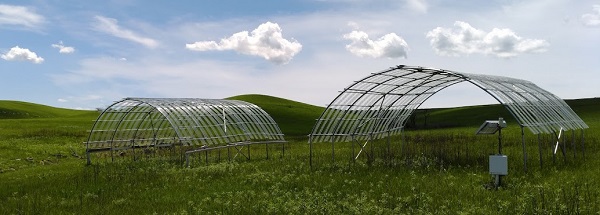
Shramps consists of 14 large shelters the reduce rainfall over established dogwood islands.
Drought and woody encroachment are likely to have interacting effects on grassland dynamics, but we know little about these interactions. In 2017, we built 14 large rainout shelters (each ~6 x 6 m) over established Cornus drummondii (roughleaf dogood) clonal shrub islands. In 2018, we began experimental droughts by reducing annual precipitation by 50%. To incorporate the role of fire as a driver of these dynamics, shelters were built on watersheds with significant woody encroachment, but now with different fire frequencies (1-yr and 4-yr). Note: both watersheds were historically 4-yr burns allowing woody encroachment. In 2011, the watershed K4A switched to an annual fire frequency. We hypothesize that drought will shift root biomass allocation patterns in both grasses and shrubs, with grasses increasing deeper root biomass and shrubs increasing total root biomass throughout the soil profile. Overall, these shifts will intensify competition between grasses and shrubs for soil moisture.
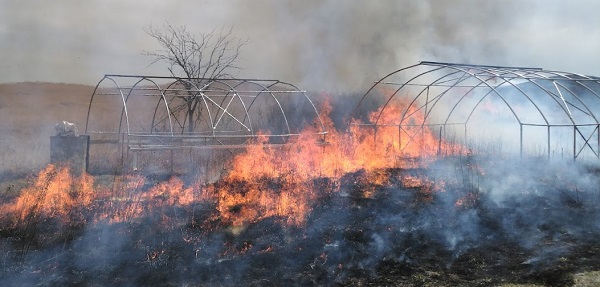
We remove the roofing materials, protect our sensors, and burn the prairie according to the prescribed fire frequency.
Plant stress is assessed by measuring physiological and morphological traits (leaf water potential, gas exchange, leaf carbon isotope composition (shrub only), leaf osmotic potential) and whole-plant traits (biomass, stem density, cover, and plant richness). Each shelter has soil moisture sensors at 5, 15, and 30 cm depth. A micromet station measures changes in atmospheric conditions every 15 min at ShRaMPs. In addition, soil respiration rates are collected every 2 weeks during the growing season.
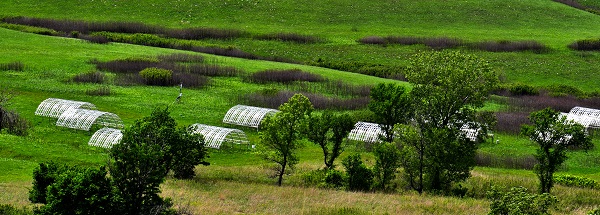
Following fire, the C4 grasses quickly regrow, greening the landscape. Clonal shrubs take longer (brown patches).
To assess how changes in drought and fire frequency impact where shrubs and grasses use water from, we are using the stable isotopes of water to discern source water uptake. Plant stem and soil water from multiple depths is collected each month during the growing season, and linked to changes in whole-plant water stress and available soil moisture.
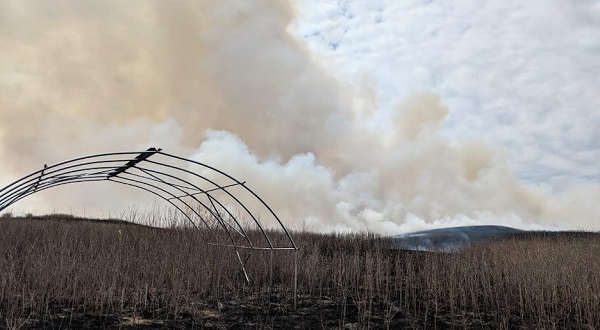
The burned landscape shows dogwood stems. Some of these stems will leaf out, and others will resprout from the base.
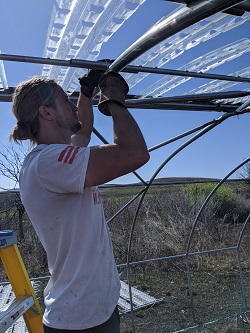
We have also assessed the water transport capability of shrubs and grasses growing in each shelter*fire treatment by measuring the maximum hydraulic conductance (Kmax) of entire root systems. We assessed the vulnerability of shrub roots to loss of function by measuring the pressure at which 50% of the maximum hydraulic conductivity is lost (P50). Results to date show that grass and shrub roots had opposite responses to drought and these patterns varied with fire treatment. Grasses growing in drought plots had lower root (Kmax) than control grasses, particularly for 1-year burned plots. Conversely, shrub (Kmax) was greater in drought roots compared to control roots for both burn treatments. Shrub drought roots were also less vulnerable to water stress than control roots (P50=-1.5 and -0.20 MPa, respectively). These results suggest that the ability of grass roots to use water declines with drought, while the ability of shrub roots to use water and resist water stress increased with drought.
Project supported by DOE-BER:
Using root and soil traits to forecast woody encroachment dynamics in mesic grassland.
Project supported by NSF-LTER:
Konza Prairie LTER: Manipulating drivers to assess grassland resilience.
Project PI's:
Dr. Lydia Zeglin (Kansas State University),
Dr. Kate McCulloh (University of Wisconsin Madison),
Dr. Kim O'Keefe (St. Edward's University),
Dr. Kevin Wilcox (University of Wyoming),
Dr. Jesse Nippert (Kansas State University)
Project Graduate Students:
Rachel Keen
(Kansas State University)
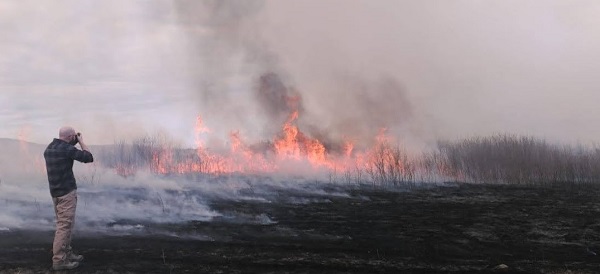
Seton capturing the disturbance.